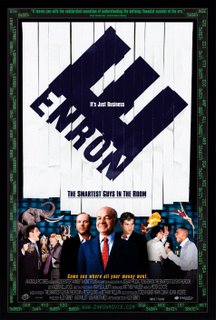Kenny Boy on the Hot Seat
Today is the start of the trial of Enron founder Kenneth Lay (or, as his friend George W. Bush refers to him, "Kenny Boy") and former Enron CEO Jeff Skilling. They're both charged with fraud and conspiracy, and Skilling is also charged with lying to auditors and insider trading.
If you wa nt to catch up on what exactly these two guys--with help from many, many others who will unfortunately probably never see the inside of a courtroom--did to get themselves into their present predicament, rent the excellent movie "Enron: The Smartest Guys In The Room", which is now available on DVD. Based on the work of reporters Bethany McLean and Peter Elkind, the movie meticulously traces the rise and fall of Enron, which at one point rose from being a middle-of-the-road Houston gas pipeline company to the country's seventh-largest corporation and the absolute darling of the New Economy. The film shows how Lay, Skilling and others built a gigantic corporate empire despite the fact that no one could ever explain how the company made any money. As it turned out, the simple answer was that it didn't--it's "profits" were all hypothetical and all of it's debt had been hidden in dummy corporations by Enron executives. Eventually the entire house of cards came tumbling down and most lower-level employees and investors lost everything. Of course, by that time Lay, Skilling and other higher-ups--who knew perfectly well that the whole thing was a scam--had cashed out to the tune of over a billion dollars, all the while reassuring the pensioners that Enron was a good, stable investment. In the film Lay's wife is asked what happened to the $300 million Lay made off with and insists that it's "just gone." Right.
nt to catch up on what exactly these two guys--with help from many, many others who will unfortunately probably never see the inside of a courtroom--did to get themselves into their present predicament, rent the excellent movie "Enron: The Smartest Guys In The Room", which is now available on DVD. Based on the work of reporters Bethany McLean and Peter Elkind, the movie meticulously traces the rise and fall of Enron, which at one point rose from being a middle-of-the-road Houston gas pipeline company to the country's seventh-largest corporation and the absolute darling of the New Economy. The film shows how Lay, Skilling and others built a gigantic corporate empire despite the fact that no one could ever explain how the company made any money. As it turned out, the simple answer was that it didn't--it's "profits" were all hypothetical and all of it's debt had been hidden in dummy corporations by Enron executives. Eventually the entire house of cards came tumbling down and most lower-level employees and investors lost everything. Of course, by that time Lay, Skilling and other higher-ups--who knew perfectly well that the whole thing was a scam--had cashed out to the tune of over a billion dollars, all the while reassuring the pensioners that Enron was a good, stable investment. In the film Lay's wife is asked what happened to the $300 million Lay made off with and insists that it's "just gone." Right.
So how did they get away with this ponzi-like scheme for so long and on such a grand stage? By creating a corporate culture--really more a religion than a culture--based on empty frat-boy posturing, insidious greed and zealous devotion to the Reaganite ideal that the unregulated market solves all problems. The most shocking part of the film details how Enron created the phony California energy crisis and rolling blackouts of 2001, then had the nerve to publicly blame the whole thing on California's lack of deregulation. Of course, there was never a shortage of power in California; in one of several infuriating recorded phone conversations one of the blustery energy traders remarks "there's plenty of power available--for the right f*cking price!" Other traders are heard asking plant managers to "get a little creative" in shutting down plants to drive up prices, laughing about ripping off "grandma Millie" with rolling blackouts and gloating about how they will all "retire by 30."
It's funny to me that outside of Houston (where the majority of victims live) there's very little outrage about what Enron did, and most people know very few of the details. The trial of Lay and Skilling is receiving a fair amount of publicity right now, but as it winds on in the months ahead I imagine the Defense's best strategy will be to turn the trial into a morass of paperwork and accountant-speak until the public's eyes start to glaze over. Roger Ebert posed an interesting question in his review of the film: If terrorists had caused California's rolling blackouts instead of corporate profiteers, would we be so casually disinterested?
The thing that's the most disturbing to me about what happened at Enron is the fact that what the company created is only the logical extension of the laissez faire ideology that currently dominates this country (See also: WorldCom, Global Crossing, Adelphia Communications and Tyco International). I have always considered myself a reluctant capitalist: for all it's dehumanizing tendencies, it is the best economic system on the planet. But everyone who buys the party line that unfettered markets are the solution and regulation is the problem needs to see this film. As for Lay, Skilling, and the rest who destroyed so many lives, any punishment they receive will be too good for them.
If you wa
 nt to catch up on what exactly these two guys--with help from many, many others who will unfortunately probably never see the inside of a courtroom--did to get themselves into their present predicament, rent the excellent movie "Enron: The Smartest Guys In The Room", which is now available on DVD. Based on the work of reporters Bethany McLean and Peter Elkind, the movie meticulously traces the rise and fall of Enron, which at one point rose from being a middle-of-the-road Houston gas pipeline company to the country's seventh-largest corporation and the absolute darling of the New Economy. The film shows how Lay, Skilling and others built a gigantic corporate empire despite the fact that no one could ever explain how the company made any money. As it turned out, the simple answer was that it didn't--it's "profits" were all hypothetical and all of it's debt had been hidden in dummy corporations by Enron executives. Eventually the entire house of cards came tumbling down and most lower-level employees and investors lost everything. Of course, by that time Lay, Skilling and other higher-ups--who knew perfectly well that the whole thing was a scam--had cashed out to the tune of over a billion dollars, all the while reassuring the pensioners that Enron was a good, stable investment. In the film Lay's wife is asked what happened to the $300 million Lay made off with and insists that it's "just gone." Right.
nt to catch up on what exactly these two guys--with help from many, many others who will unfortunately probably never see the inside of a courtroom--did to get themselves into their present predicament, rent the excellent movie "Enron: The Smartest Guys In The Room", which is now available on DVD. Based on the work of reporters Bethany McLean and Peter Elkind, the movie meticulously traces the rise and fall of Enron, which at one point rose from being a middle-of-the-road Houston gas pipeline company to the country's seventh-largest corporation and the absolute darling of the New Economy. The film shows how Lay, Skilling and others built a gigantic corporate empire despite the fact that no one could ever explain how the company made any money. As it turned out, the simple answer was that it didn't--it's "profits" were all hypothetical and all of it's debt had been hidden in dummy corporations by Enron executives. Eventually the entire house of cards came tumbling down and most lower-level employees and investors lost everything. Of course, by that time Lay, Skilling and other higher-ups--who knew perfectly well that the whole thing was a scam--had cashed out to the tune of over a billion dollars, all the while reassuring the pensioners that Enron was a good, stable investment. In the film Lay's wife is asked what happened to the $300 million Lay made off with and insists that it's "just gone." Right.So how did they get away with this ponzi-like scheme for so long and on such a grand stage? By creating a corporate culture--really more a religion than a culture--based on empty frat-boy posturing, insidious greed and zealous devotion to the Reaganite ideal that the unregulated market solves all problems. The most shocking part of the film details how Enron created the phony California energy crisis and rolling blackouts of 2001, then had the nerve to publicly blame the whole thing on California's lack of deregulation. Of course, there was never a shortage of power in California; in one of several infuriating recorded phone conversations one of the blustery energy traders remarks "there's plenty of power available--for the right f*cking price!" Other traders are heard asking plant managers to "get a little creative" in shutting down plants to drive up prices, laughing about ripping off "grandma Millie" with rolling blackouts and gloating about how they will all "retire by 30."
It's funny to me that outside of Houston (where the majority of victims live) there's very little outrage about what Enron did, and most people know very few of the details. The trial of Lay and Skilling is receiving a fair amount of publicity right now, but as it winds on in the months ahead I imagine the Defense's best strategy will be to turn the trial into a morass of paperwork and accountant-speak until the public's eyes start to glaze over. Roger Ebert posed an interesting question in his review of the film: If terrorists had caused California's rolling blackouts instead of corporate profiteers, would we be so casually disinterested?
The thing that's the most disturbing to me about what happened at Enron is the fact that what the company created is only the logical extension of the laissez faire ideology that currently dominates this country (See also: WorldCom, Global Crossing, Adelphia Communications and Tyco International). I have always considered myself a reluctant capitalist: for all it's dehumanizing tendencies, it is the best economic system on the planet. But everyone who buys the party line that unfettered markets are the solution and regulation is the problem needs to see this film. As for Lay, Skilling, and the rest who destroyed so many lives, any punishment they receive will be too good for them.






2 Comments:
I rented the film and was really shocked by it. I was sort of young when the sh*t hit the fan and didn't completly understand what was so terrible about the whole thing. It's amazing what people think they can get away with... and they still may get away with it. Ahhh...America!
What do you mean you were sort of young then? It was only about 4 years ago.
Post a Comment
<< Home